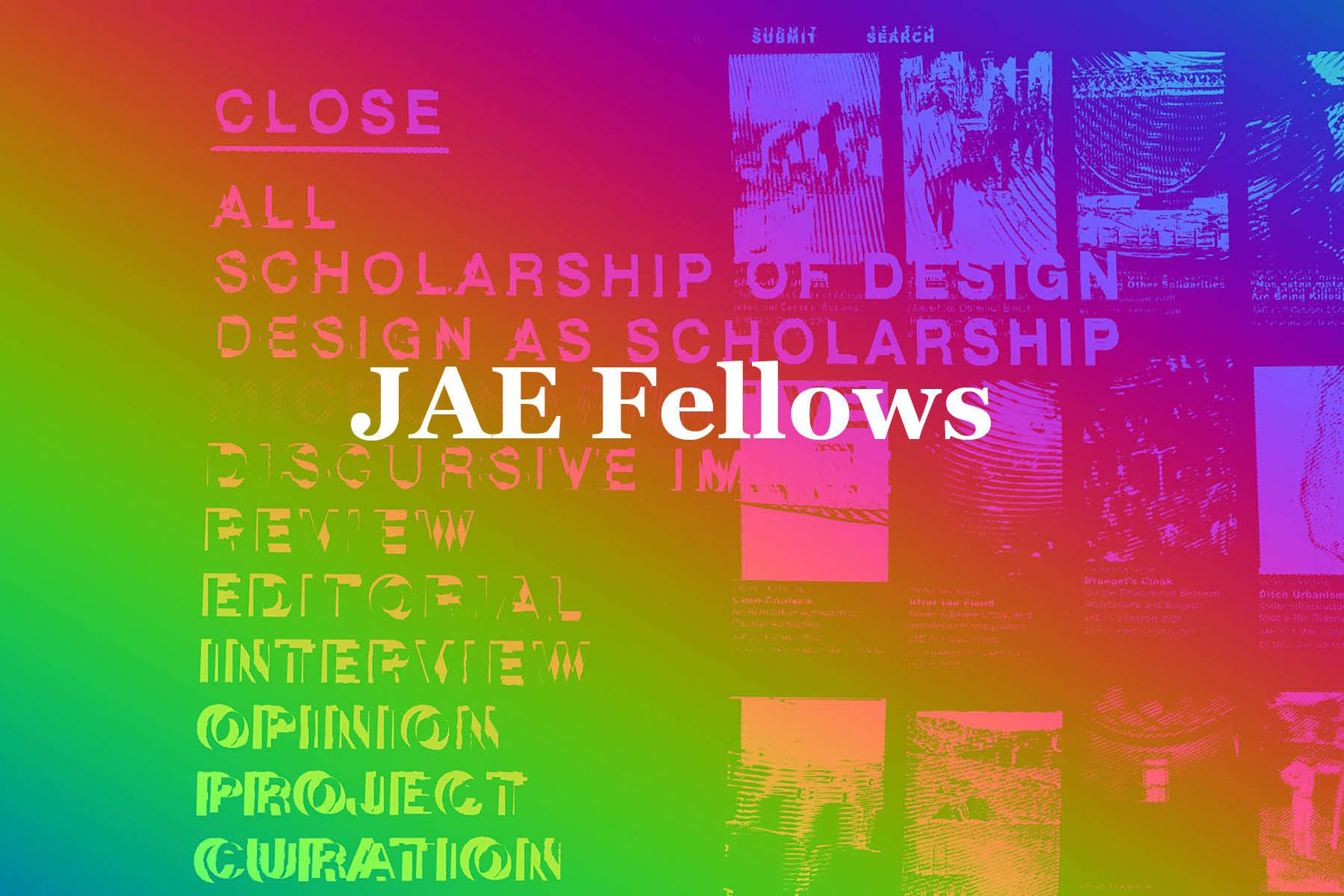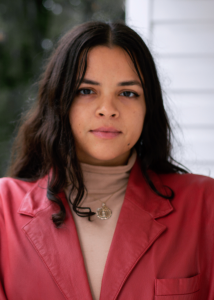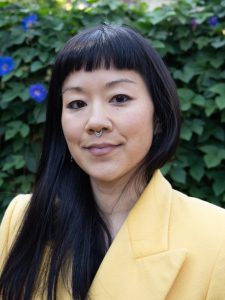
SUPPORTING FELLOWSHIPS FOR BIPOC WRITERS AND DESIGNERS
For Immediate Release:
Washington, D.C., August 16, 2024 – The Journal of Architectural Education (JAE) and the Association of Collegiate Schools of Architecture (ACSA) are pleased to announce the 2024-2025 members of the JAE Fellows Program: Jelisa Blumberg, Luna BuGhanem, Tonia Sing Chi, and Margarida Waco.
The JAE Fellows Program was established to address the pressing need for increased support and representation of Black, Native/Indigenous Peoples, and other people of color in architectural discourse. These fellowships are intended to support BIPOC writers and designers, whether working individually or collaboratively, who are not currently affiliated with a university full-time.
Each fellowship includes an individually tailored commitment of mentorship and advocacy from the JAE Fellows Advocates, an international network of renowned architectural educators. The 2024-2025 JAE Fellows Advocates comprise Ivonne Santoyo-Orozco of Bard College; Mitch McEwen and Jay Cephas of Princeton University, Cruz Garcia and Nathalie Frankowski of Iowa State University; Chris Cornelius of the University of New Mexico; Vernelle Noel of Carnegie Mellon University; Mohamad Nahleh of the Ohio State University; Bz Zhang of the Los Angeles Neighborhood Land Trust, Design As Protest Collective and Dark Matter U; Joyce Hwang of the University of Buffalo; and Zannah Matson of the University of Colorado Boulder.
Extensive programming is planned to highlight the Fellows’ work, such as webinars, interviews, online conversations, and other events to engage a broader public, including students, and to open an expansive discourse on the future of disciplinary scholarship and publication. The JAE Fellows’ work will be published at the end of the Fellowship period on JAE’s website (www.jaeonline.org) in Fall 2025.

Jelisa Blumberg is a transdisciplinary designer, artist, and educator with a background in architecture and lighting, based in Baltimore, MD. She prioritizes collective thinking and making, using collaboration to expand discourse on value systems related to aesthetic culture, spatial practice, and emergent methodologies. Currently, she’s interested in exploring the validity of hyper-intimate knowledge alongside theories of industrialized landscapes.

Luna BuGhanem is an artist, researcher, and architectural designer based between New York City and Beirut. In her practice, Luna investigates, documents, and represents the intertwinement of travel and the built environment across scales, including objects, materials, tools, and networks.
Her current research develops “diasporic homemaking,” the process through which diaspora members build houses in their homeland while and from abroad or back and forth between locales. Through oral histories, site visits, and WhatsApp chat archives, she seeks to reveal how remittance-funded houses in the villages of Mount Lebanon are contingent upon the economic and political factors of multiple countries, personal circumstances, and cross-border digital mediations.
Luna is an MIT SMArchS graduate and holds a BArch and a BFA from RISD. At RISD, she served as a Teaching Fellow in the Department of Architecture and worked with the Strategic Design Pedagogies research team. While at MIT, she was a Teaching Development Fellow for design subjects and assisted the Teaching and Learning Lab in assessing the inclusivity and equitability of the institute’s syllabi.

Tonia Sing Chi is an architect, builder, and educator based in Oakland on Ohlone land, where she is from. Through her creative practice Peripheral Office, she weaves together built environment storytelling, place-based building practices, earthen architectural traditions, and collective, cross-cultural approaches to architecture and preservation. Her research into the ethics and dynamics of participatory design and activism work by architects often leads her to interrogate and reveal the historically extractive nature of community-engaged processes and community-institutional partnerships, and instead advocate for building truly reciprocal relationships and long-term knowledge coalitions among local communities, design professionals, and academia.
Tonia is a co-founder and director of community design at Nááts’íilid Initiative, an Indigenous-led nonprofit strengthening the cultural and economic resilience of Dinétah through self-reliance initiatives in the built environment. She is also a design-build instructor with Girls Garage and a core organizer with Dark Matter U. Tonia has taught courses on design justice, reparations and the built environment, design-build, and furniture making at the University of California Berkeley, the University at Buffalo, Florida A&M University, and the University of Utah. She holds an MArch and a master’s of science in historic preservation from Columbia University’s Graduate School of Architecture, Planning and Preservation, where she received the Charles McKim Prize for Excellence in Design. In 2023, she launched Storytelling Spaces of Solidarity in the Asian Diaspora (SSSAD), an ongoing initiative that engages Asian diasporic designers in learning, building, and practicing intra- and inter-community solidarity through storytelling, memory work, and knowledge sharing.

Margarida Waco (Cabinda/Denmark) is an architect and writer. Her practice mobilizes topics pertaining to politics, extractivism, and ecology through design, research, and pedagogy. Herein, she interrogates the systems and infrastructures that organize and hold our lives in separation whilst drawing on Black radical thought to imagine possible forms of redress, transformation, and refusal.
She has presented and exhibited work internationally, including at the 18th Venice Architecture Biennale, Architekturmuseum der TUM, Palais de Tokyo, Malmö Art Museum, Nyansapo Afrofeminist Festival, Arquiteturas Film Festival, and Copenhagen Architecture Festival. She is the co-author of ‘Informal Horizons’ (Royal Danish Academy, 2019), and the co-editor of ‘Pan-Africanism’ (The Funambulist, 2020) and ‘Homeplace – A Love Letter’ (Architekturmuseum der TUM, 2023). Her writing has been published in Aprender a desaprender (Dafne Editora, 2024), Afterall, Ellipses Journal of Creative Research, STOÀ Journal for Architectural Design Pedagogies, Archive of Forgetfulness, among others.
Margarida directs an architectural design studio at the Royal College of Art – School of Architecture in London, and is an Editorial Advisor to The Funambulist where she previously held the position as the Head of Strategic Outreach. She received her MA in Architecture from the Royal Danish Academy with a background in Sustainable Development from Sciences Po Paris and Journalism from Roskilde University.
–
About the Association of Collegiate Schools of Architecture
Founded in 1912 by 10 charter members, ACSA is an international association of architecture schools preparing future architects, designers, and change agents. Our full members include all of the accredited professional degree programs in the United States and Canada, as well as international schools and two- and four-year programs. Together, ACSA schools represent some 7,000 faculty educating more than 40,000 students.
ACSA seeks to empower faculty and schools to educate increasingly diverse students, expand disciplinary impacts, and create knowledge for the advancement of architecture. For more information, visit www.acsa-arch.org.
About the Journal of Architectural Education
The Journal of Architectural Education is a biannual peer-reviewed academic journal published by Routledge, Taylor & Francis on behalf of the Association of Collegiate Schools of Architecture. The JAE has been the primary venue for research and commentary on architectural education since it was founded in 1947, making it the oldest continuing operating journal of its kind.






